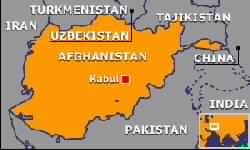Live rockets, missiles and mortars littered the streets of the scruffy Afghan border town of Spin Boldak on Saturday after an arms dump blew up, killing at least 25 people and leaving a trail of destruction.
Firemen were still struggling to control a blaze at the smouldering weapons depot in Spin Boldak, 90 km southeast of Kandahar, more than 24 hours after the blast, which unleashed a chain of secondary explosions that continued for hours.
"Looking at the ammunition spread all over the town, it seems like it rained rockets," one resident said.
The cause of the blast has not been established.
Afghan officials said it may have been set off by a rocket attack on the depot by suspected fugitive al Qaeda militants or it might have been an accident.
A senior western source said locals also believed a grenade may have been thrown into the arms dump, just across the border from the Pakistani town of Chaman.
Spin Boldak is a main transit point for many of the Afghan refugees returning home from Pakistan to try to rebuild their lives after 23 years of war. It lies on the road to Kandahar, the main city in southern Afghanistan.
Residents and local officials said six more bodies had been found since Friday, lifting the death toll to 25 soldiers and civilians.
At least 53 people were injured and several soldiers on duty at the depot were missing, they said. Most of the wounded were moved to hospital in the city of Kandahar or to Pakistan.
"Four more bodies of soldiers were found in the debris overnight raising the number of killed soldiers to 11," an Afghan army officer told Reuters.
The bodies of two labourers were found at a customs house on the same street as the offices of the United Nations World Food Programme (WFP) and UNHCR refugee agency, raising the civilian death toll to 14, he said.
HELP SEEN LACKING
Walls on three sides of the depot lay in ruins, as did an adjacent mosque which had only one wall still standing.
Unexploded rockets, bombs, anti-tank missiles and landmines sent flying in the explosions could be seen on the streets within a two km (one mile) radius of the depot.
Residents complained Afghan authorities were doing nothing to help them search for missing relatives and were instead only worried about the depot.
"People are working on self-help basis to find their relatives from under the debris," one resident said.
Water bowsers, hired from private owners to fight the fire, roared through Spin Boldak's streets as civilians searched for survivors under the rubble of collapsed roofs.
"There is a complete chaos in the city," a resident said. Afghan soldiers pulled the film from journalists' cameras to stop them from photographing the destruction.
The blast punched large holes in the walls of the WFP and UNHCR offices and a WFP official said relief operations for needy Afghans had been suspended until the food agency's premises had been declared clear of unexploded ordnance.
"There are bombs, landmines and rockets lying all over the place so we have called a de-mining team to come and clear them," the WFP official said. "Until the time these explosives are removed, we cannot start our operations."
Afghan officials said the depot had been set up at a former Muslim religious seminary during operations against fugitive Taliban and al Qaeda militants in southern Afghanistan following last year's U.S. air strikes.
MAP CAPTION
Landlocked and mountainous, Afghanistan has suffered from such chronic instability and conflict during its modern history that its economy and infrastructure are in ruins, and many of its people are refugees. It is also afflicted by natural calamities such as earthquakes and drought.
- Author:
Reuters - Section:
WORLD HEADLINES


 Home
Home Discover Islam
Discover Islam Quran Recitations
Quran Recitations Lectures
Lectures
 Fatwa
Fatwa Articles
Articles Fiqh
Fiqh E-Books
E-Books Boys & Girls
Boys & Girls  Hajj Rulings
Hajj Rulings Hajj Fatwas
Hajj Fatwas














